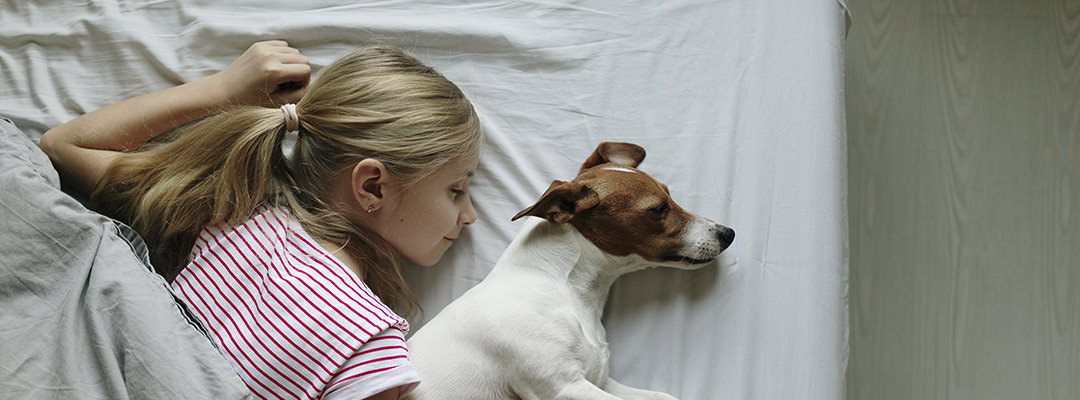Our relationship with our pets can be beautiful and complex. For some of us, they’re family members, best friends, confidantes, someone we can trust with our most heartfelt secrets and share our best memories with. So isn’t it natural to want to snuggle up with our furry friends?
The sleeping with pets debate has been going on at least as long as modern medicine, and you’ll find some pretty strong opinions on both sides. Let’s explore the pros and cons of sharing a bed with your pet, so you can make the choice that’s right for you.
Should you let pets sleep in bed with you?
Letting pets sleep in your bed is a personal choice that’s influenced by your lifestyle, health, and living situation. Most medical professionals agree that it’s safe to share your bed with your pet for most people, as long as you take certain precautions — we’ll look at those more below.
In fact, some people experience huge mental and emotional benefits from letting their pet sleep in their bed. It can be very helpful for people who suffer from chronic loneliness or anxiety to have someone to snuggle up with. As long as you don’t suffer from allergies, sleep with small children, or experience chronic sleep disorders, sharing a bed with your pet isn’t harmful and can even be beneficial in the long term.
Is there a difference between sleeping with dogs or cats?
Both dogs and cats can be beneficial sleep partners in the right circumstances. Most of the medical research surrounding co-sleeping with pets has focused specifically on dogs; for instance, studies have been done that show how sleeping with dogs can play a promising role in the treatment of sleep disorders. Some service dogs receive special training to help keep their owners safe if they suffer from disorders such as narcolepsy.
One study found that cats, on the other hand, can be more disruptive to sleep cycles — probably because cats are more likely to sleep for short bursts and then wake up feeling restless. However, just like people, every animal is different. If your animal is well behaved, you can get the same emotional benefit from sleeping with either a dog or a cat.
Other pets, such as rabbits, snakes, gerbils, or anything else that you’ve brought home as a friend, should be considered on a case-to-case basis. If your animal is very small, consider whether or not you could harm them by accidentally rolling over in your sleep, or if your blankets might prove a suffocation risk.
Pros of co-sleeping with your pet
Let’s dive deeper into a few of the benefits of sharing your bed with your pet.
Comfort and security
The biggest reason people choose to sleep with a pet in their bed is the feeling of comfort it gives them. A study of American women showed that sleeping with a dog increased feelings of safety at night. In addition, some dogs can be trained specifically to help people with PTSD and know how to look for signs of traumatic nightmares. And many people who spend their workdays away from their pets just like being able to come home and spend the night with them after a hard day.
Improved mental health
Numerous studies have found that animals play a huge role in mental health treatments over time. While some service dogs are trained specifically for this role, even pets that haven’t been brought up as service animals can be a positive force for their owners. Co-sleeping with your pet can release positive hormones in the brain, make you feel safer, and create a lower-stress environment during the nighttime hours.
Lower blood pressure and stress levels
Sleeping with pets in your bed has also been shown to have a positive impact on our physical health, too. One study showed that by lowering our stress and anxiety levels, sleeping with pets can actually lessen the effects of chronic pain conditions. Others have shown that sleeping with a pet can actually result in love or blood pressure, which in turn can help protect our bodies against a range of different conditions later on. Interacting with animals has also been shown to lower our levels of cortisol or the stress hormone.
Risks of co-sleeping with your pet
Now that we’ve looked at the great things about sleeping with your pet in your bed, let’s examine some of the risks to be mindful of as you make your choice.
Allergies
Pet allergies, unfortunately, plague millions of people worldwide, and snuggling up with your pet at night can make it even worse. If you take allergy medication, spending the night in bed with your pet can make the medication less effective over time and force you to up your dosage, which can be harmful to the body over the long term. If you suffer from pet allergies, it’s recommended you don’t even let pets into your bedroom to lower the risk of contamination as you sleep.
Reduced quality of sleep
One of the biggest risks of sleeping with a pet in your bed is how much they can disrupt your sleep cycle — which, as we know, can have some dire long-term effects on your overall health. Pets can wake up during the night looking for attention, or wake you up accidentally as they move around in your sleep, or lash out if you accidentally roll over onto them. Over the long term, these interruptions can add up and you can start to experience sleep disorders and other health problems.
Germ exposure
Pets, and in particular outdoor pets, aren’t always the cleanest of creatures. They can carry hordes of invisible bacteria, parasites, and diseases, which they then bring into your sleeping space. People with lower immune systems who are particularly prone to infection should be mindful of the exposure and health risks sleeping with pets might bring.
Should children sleep with pets?
While many of us sleep with pets during our adult lives, sometimes we also want our children to feel safe and comforted by our animal friends. However, this can cause problems, especially for younger children. Children are still developing their immune systems and are more susceptible to the sorts of germs and bacteria that pets carry with them. Since they’re going through a period of intense growth, they also need to prioritize good quality sleep. Children need, on average, about two hours more uninterrupted sleep than most adults. Co-sleeping with pets can compromise this.
Safety also becomes a bigger concern, both for the child and the animal involved. Children often don’t know how to read body language from their pets, and the animal can start to feel claustrophobic or uncomfortable, which may lead to them scratching or biting. Children may also be less aware of their physical space as they sleep, and might harm the pet by accident. For these reasons, it’s recommended that children don’t sleep with pets until they’re about twelve or thirteen years old. However, they can still enjoy spending time with their furred friends while they’re awake.
Tips for sleeping with your pet in the healthiest way possible
When you allow your pet to join you in bed for the night, safety and cleanliness should be at the forefront of your mind. Make sure your bed is big enough for you both to sleep comfortably, even if you move around during the night. Consider brushing down your pet’s fur before bed to get rid of any germs or environmental parasites so they don’t bring them into your sleeping space.
If you expect to be sleeping with your pet often, make sure to get them checked on a regular basis by their veterinarian. You may also want to wash your bedding more regularly than you would normally — once a week at the absolute least. Keep a spare set or two so that you can rotate them out as needed. It’s a good idea to avoid harsh synthetic fragrances in your washing, as these can aggravate the sensitive noses of some animals. By keeping you, your pet, and your bed safe and clean, you can both enjoy the comfort, health benefits, and love of sharing a sleep space together.
Did you like it?4.5/5 (25)





